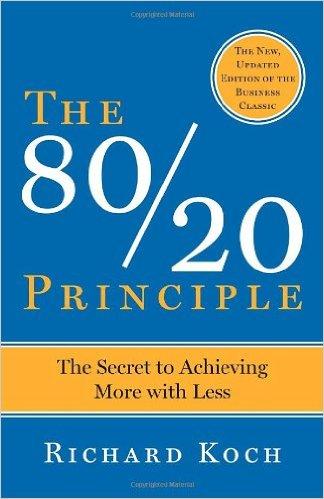
Richard Koch is the author of The 80/20 Principle; The Secret to Achieving More with Less. Be prepared if you decide to read this book; it will make you uncomfortable about the way you spend your time, and perhaps even about the way you live your life. The premise of the book comes from the Pareto Principle (also known as the 80–20 rule and the law of the vital few) which states that, for many events, roughly 80% of the effects come from 20% of the causes.
You wear about 20 percent of your wardrobe about 80 percent of the time. You interact with 20 percent of your friends and family about 80 percent of the time. Koch spends a good portion of the book painting a compelling picture of how business can analyze and focus on where its profits come from and who are its most productive workers and customers.
Chaos Theory provides the reason to measure and master the “vital few” factors. Chaos Theory introduces the concept of “predictable nonlinearity.” It states that nature is unbalanced, and eventually, it becomes more and more unbalanced. Equilibrium is fleeting and impermanent; the big get bigger; the rich really do get richer and the powerful really do get more powerful. A product that is just 10 percent better than the competition will eventually capture 70 percent of market share.
Koch talks about his early education at Oxford, and how he learned to get the most academic results from the least input (the sacred quest of every university student.) His tutor recommended that he never attend lectures; books could be read more quickly. “But never read a book from cover to cover, except for pleasure. … Read the conclusion, then the introduction. Then dip lightly into any interesting bits.” In other words, 80 percent of the value of a book can be found in 20 percent of its content, and absorbed in 20 percent of the time it would take to read it thoroughly. Koch applied this theory very effectively throughout his college career and beyond.
Koch promotes 80/20 analysis as a precise, quantitative look at facts that can help companies make better decisions about how they do business, structure rewards and pursue market share. What he calls “80/20 thinking” is a fuzzier, qualitative approach to structuring your career and personal life to maximize your success and happiness.
In order to embrace Chaos Theory and the Law of the Vital Few, you must adjust your thinking and possibly your entire work ethic. Traditional wisdom tells you that you can do anything if you work hard enough at it. Working diligently to master new skills builds character. Koch says forget that; focus solely on things you love and that come easily for you. Find work doing what you do better than others, and hire out the rest. If you’re building a career or business, don’t struggle with the skills that are not your strength. Hire an accountant, housecleaner, graphic designer, or administrative assistant. Spend your time developing and using the skills (and just a few of them) at which you excel and for which people will pay you.
Here goes the rest of your middle class work ethic: Take short cuts whenever possible; do important work with the least possible effort. Skim instead of read, because 80 percent of the value of a book or article is in 20 percent of its content. Start projects later rather than sooner, because 80 percent of the work is completed within 20 percent of time left before the deadline. Only 20 percent of conversations or meetings you have really matter; skip meetings, discussions and events that probably won’t produce results. Say no more, with fewer regrets.
Koch says, “Time management is not the answer…It’s the way we treat time, even the way we think about it, that is the problem – and the opportunity. We need a Time Revolution.” More about that in another post.

